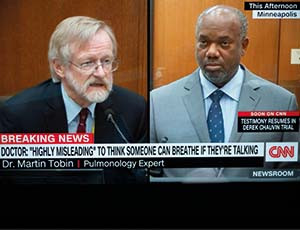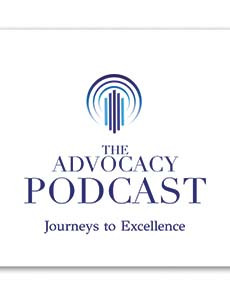*/

The Advocacy Podcast: Journeys to Excellence Season 2, which launched in January 2022, contains tips from leading trial lawyers and advocacy coaches from America, Australia, and the UK. Host Bibi Badejo interviewed, in episode order: Jerry Blackwell and Steve Schleicher (prosecutors in the trial of George Floyd’s murderer, Derek Chauvin); Professor Jo Delahunty QC; Lucy Cornell (voice coach and consultant to barristers around the world); Ross Guberman (legal writing consultant and trainer, including to US federal judges); and James Pereira QC. All inspiring and eye-opening – we try here to distil some of their advice.
‘You can learn advocacy from so many different sources, but you actually have to listen to people and you have to check your ego at the door… and be receptive’ (Steve Schleicher). James Pereira QC recalled hearing charming narrative-driven advocacy years earlier, that he still aims to emulate. The importance of word choice hit Steve Schleicher as a young prosecutor when a paralegal told him that ‘attack’ was best, not ‘fight’ – long before ‘9 minutes and 29 seconds’ would echo around the world. Ross Guberman systematises and shares what respected lawyers and judges do in their writing, so we can try to follow suit.
‘To the extent I have any effectiveness as a trial lawyer, I’m just a patchwork quilt of bits and pieces I’ve taken from all kinds of other good trial lawyers’ (Jerry Blackwell).
Really listen. Jo Delahunty QC reminds us that the skill set of barristers includes listening as much as speaking; being conscious not just of words, but the environment of the courtroom, our interactions with clients, and other advocates. Good advocates will investigate what is going on for the other person in any interaction. Why is a witness overtalking? Why is the judge asleep? Or holding their breath? ‘People get scared of silence […] but actually, if you think of the pause as a time when you can […] investigate what’s happening now for everyone else, the pressure’s off’ (Lucy Cornell). James Pereira QC (also trained in NLP and systemic work) makes the point that rich information can come from all of our senses. When an expert witness placed his hand on his heart, James highlighted and questioned it, and used it to powerfully demonstrate that conclusions were based on unjustified feelings.
It is fascinating to hear different approaches to preparation. Jerry Blackwell and Steve Schleicher have considerable experience working in teams, filled with friendly but competitive cooperation. Jo Delahunty QC, self-identified ‘prep queen’, says never take a narrative from someone else; start by reading the raw material that informs key reports (medical records not expert reports); the spine of a cross-examination is your chronology. James Pereira QC will start at the heart – the impugned decision in a judicial review, for example – and let that act as roadmap. He is not a fan of long chronologies or schedules and uses his cross-examination preparation itself as his main organisational tool.
Steve Schleicher and Jo Delahunty QC speak of just how far they go researching expert witnesses before cross-examination. And universally endorsed is the importance of analysing and thinking about the case against you. ‘Bring all the energy and creativity that you have to figuring out [your opponent’s case]’ (Jerry Blackwell). The bad facts against you will be spotted so embrace them; Jo Delahunty QC gives examples of how even a ‘slam dunk’ might be unpicked ‘without needing to be anything other than very curious’.
Jerry Blackwell’s masterful examination and cross-examination of medical experts Dr Tobin and Dr Fowler are available to watch in full online; so, too, Steve Schleicher’s ‘field day’ cross of the use-of-force expert Barry Brodd.
In our interviews they reflect on those performances, including that ‘It’s all advocacy. And sometimes you use words’ (Jerry Blackwell). Jerry physically held up Dr Tobin’s weighty tome on pulmonology to demonstrate expertise; he referred Dr Fowler to his own testimony from another case, not in great detail but enough to make Dr Fowler more pliant (a technique also referred to by James Pereira QC); Steve broke with guidance and asked Barry Brodd an open question knowing there was no good answer, letting the bad answer sit and repeating it back. Why not give your decision-maker a physical experience to engage them, like Jerry and Dr Tobin inviting jurors to touch their neck to identify the hypopharynx? All carefully planned and intentional acts.
Be intentional also with your choice of witnesses, and witness ordering. The three key phases of the Chauvin trial – what the bystanders saw, why it was against the law, and how George Floyd (medically) died – was no accident. Jo Delahunty QC explains how she very intentionally, and proportionately, makes decisions about cross-examining front line medics or police officers at fact-finding hearings.
Lucy Cornell tells us of the paradigm shift needed to understand advocacy as a physical act as much as an intellectual act. If you feel tight, even just to start, or want more resonance in your courtroom performances then you need to warm up. Something as simple as a walk around the block while speaking – out loud – the first lines of your opening can work wonders. If not star jumps, get your body and your voice in the zone somehow. Exercise and play with your voice. If you speak too quickly and do not let ideas ‘land’ then you’re probably too reliant on your planned text; true control is coming back to the moment.
Jo Delahunty QC and James Pereira QC talk of being fluid and agile; able to move between issues with a witness or tribunal so that you retain control, and have fun! Jerry Blackwell spoke of the sense of belonging he felt as a junior at an acting for lawyers’ training day, seeing the partners learn to use the ‘stage’ of the courtroom. You have to be very well prepared, but do not be afraid to take every opportunity to ‘get up and dance’ (Jerry Blackwell).
Your written word should be helped to ‘jump off the page’ says Ross Guberman. He identifies a thread in the writing of Lord Denning, US Supreme Court justices, and prestigious and respected advocacy stars: vigour and verve. Ross also gives tips to motivate your readers and conquer writer’s block: think in threes; meaningfully introduce quotes; make your text more manageable by breaking it up (sections and proper margins); ruthlessly trim but in a positive sense. Why use ‘increase dramatically’ if the more visual ‘skyrocket’ fits? Don’t skirt around when even the heading could be a declarative commitment of the point you need to make! Steve Schleicher’s direct closing speech does similar with its clear ‘ask’ of the jury. ‘What a lot of lawyers do is they put the burden on themselves to just relay a lot of information and make sure they’re being exhaustive, but they haven’t actually committed to a coherent point’ (Ross Guberman); avoid that trap.
This is just a fraction of our guests’ advice. For podcast episodes, information about the guests, and recommended resources, go to www.theadvocacypodcast.com.


The Advocacy Podcast Season 2 episodes in full: Jerry Blackwell and Steve Schleicher: Prosecuting Derek Chauvin (Part 1) – Preparation and (Part 2) Trial techniques | Prof Jo Delahunty QC: Winning the unwinnable | Lucy Cornell: Finding your voice in court | Ross Guberman: Writing for the Win | James Pereira QC: Communication in the courtroom

The Advocacy Podcast: Journeys to Excellence Season 2, which launched in January 2022, contains tips from leading trial lawyers and advocacy coaches from America, Australia, and the UK. Host Bibi Badejo interviewed, in episode order: Jerry Blackwell and Steve Schleicher (prosecutors in the trial of George Floyd’s murderer, Derek Chauvin); Professor Jo Delahunty QC; Lucy Cornell (voice coach and consultant to barristers around the world); Ross Guberman (legal writing consultant and trainer, including to US federal judges); and James Pereira QC. All inspiring and eye-opening – we try here to distil some of their advice.
‘You can learn advocacy from so many different sources, but you actually have to listen to people and you have to check your ego at the door… and be receptive’ (Steve Schleicher). James Pereira QC recalled hearing charming narrative-driven advocacy years earlier, that he still aims to emulate. The importance of word choice hit Steve Schleicher as a young prosecutor when a paralegal told him that ‘attack’ was best, not ‘fight’ – long before ‘9 minutes and 29 seconds’ would echo around the world. Ross Guberman systematises and shares what respected lawyers and judges do in their writing, so we can try to follow suit.
‘To the extent I have any effectiveness as a trial lawyer, I’m just a patchwork quilt of bits and pieces I’ve taken from all kinds of other good trial lawyers’ (Jerry Blackwell).
Really listen. Jo Delahunty QC reminds us that the skill set of barristers includes listening as much as speaking; being conscious not just of words, but the environment of the courtroom, our interactions with clients, and other advocates. Good advocates will investigate what is going on for the other person in any interaction. Why is a witness overtalking? Why is the judge asleep? Or holding their breath? ‘People get scared of silence […] but actually, if you think of the pause as a time when you can […] investigate what’s happening now for everyone else, the pressure’s off’ (Lucy Cornell). James Pereira QC (also trained in NLP and systemic work) makes the point that rich information can come from all of our senses. When an expert witness placed his hand on his heart, James highlighted and questioned it, and used it to powerfully demonstrate that conclusions were based on unjustified feelings.
It is fascinating to hear different approaches to preparation. Jerry Blackwell and Steve Schleicher have considerable experience working in teams, filled with friendly but competitive cooperation. Jo Delahunty QC, self-identified ‘prep queen’, says never take a narrative from someone else; start by reading the raw material that informs key reports (medical records not expert reports); the spine of a cross-examination is your chronology. James Pereira QC will start at the heart – the impugned decision in a judicial review, for example – and let that act as roadmap. He is not a fan of long chronologies or schedules and uses his cross-examination preparation itself as his main organisational tool.
Steve Schleicher and Jo Delahunty QC speak of just how far they go researching expert witnesses before cross-examination. And universally endorsed is the importance of analysing and thinking about the case against you. ‘Bring all the energy and creativity that you have to figuring out [your opponent’s case]’ (Jerry Blackwell). The bad facts against you will be spotted so embrace them; Jo Delahunty QC gives examples of how even a ‘slam dunk’ might be unpicked ‘without needing to be anything other than very curious’.
Jerry Blackwell’s masterful examination and cross-examination of medical experts Dr Tobin and Dr Fowler are available to watch in full online; so, too, Steve Schleicher’s ‘field day’ cross of the use-of-force expert Barry Brodd.
In our interviews they reflect on those performances, including that ‘It’s all advocacy. And sometimes you use words’ (Jerry Blackwell). Jerry physically held up Dr Tobin’s weighty tome on pulmonology to demonstrate expertise; he referred Dr Fowler to his own testimony from another case, not in great detail but enough to make Dr Fowler more pliant (a technique also referred to by James Pereira QC); Steve broke with guidance and asked Barry Brodd an open question knowing there was no good answer, letting the bad answer sit and repeating it back. Why not give your decision-maker a physical experience to engage them, like Jerry and Dr Tobin inviting jurors to touch their neck to identify the hypopharynx? All carefully planned and intentional acts.
Be intentional also with your choice of witnesses, and witness ordering. The three key phases of the Chauvin trial – what the bystanders saw, why it was against the law, and how George Floyd (medically) died – was no accident. Jo Delahunty QC explains how she very intentionally, and proportionately, makes decisions about cross-examining front line medics or police officers at fact-finding hearings.
Lucy Cornell tells us of the paradigm shift needed to understand advocacy as a physical act as much as an intellectual act. If you feel tight, even just to start, or want more resonance in your courtroom performances then you need to warm up. Something as simple as a walk around the block while speaking – out loud – the first lines of your opening can work wonders. If not star jumps, get your body and your voice in the zone somehow. Exercise and play with your voice. If you speak too quickly and do not let ideas ‘land’ then you’re probably too reliant on your planned text; true control is coming back to the moment.
Jo Delahunty QC and James Pereira QC talk of being fluid and agile; able to move between issues with a witness or tribunal so that you retain control, and have fun! Jerry Blackwell spoke of the sense of belonging he felt as a junior at an acting for lawyers’ training day, seeing the partners learn to use the ‘stage’ of the courtroom. You have to be very well prepared, but do not be afraid to take every opportunity to ‘get up and dance’ (Jerry Blackwell).
Your written word should be helped to ‘jump off the page’ says Ross Guberman. He identifies a thread in the writing of Lord Denning, US Supreme Court justices, and prestigious and respected advocacy stars: vigour and verve. Ross also gives tips to motivate your readers and conquer writer’s block: think in threes; meaningfully introduce quotes; make your text more manageable by breaking it up (sections and proper margins); ruthlessly trim but in a positive sense. Why use ‘increase dramatically’ if the more visual ‘skyrocket’ fits? Don’t skirt around when even the heading could be a declarative commitment of the point you need to make! Steve Schleicher’s direct closing speech does similar with its clear ‘ask’ of the jury. ‘What a lot of lawyers do is they put the burden on themselves to just relay a lot of information and make sure they’re being exhaustive, but they haven’t actually committed to a coherent point’ (Ross Guberman); avoid that trap.
This is just a fraction of our guests’ advice. For podcast episodes, information about the guests, and recommended resources, go to www.theadvocacypodcast.com.


The Advocacy Podcast Season 2 episodes in full: Jerry Blackwell and Steve Schleicher: Prosecuting Derek Chauvin (Part 1) – Preparation and (Part 2) Trial techniques | Prof Jo Delahunty QC: Winning the unwinnable | Lucy Cornell: Finding your voice in court | Ross Guberman: Writing for the Win | James Pereira QC: Communication in the courtroom


The Bar Council is ready to support a turn to the efficiencies that will make a difference
By Louise Crush of Westgate Wealth Management
Marie Law, Director of Toxicology at AlphaBiolabs, examines the latest ONS data on drug misuse and its implications for toxicology testing in family law cases
An interview with Rob Wagg, CEO of New Park Court Chambers
What meaningful steps can you take in 2026 to advance your legal career? asks Thomas Cowan of St Pauls Chambers
Marie Law, Director of Toxicology at AlphaBiolabs, explains why drugs may appear in test results, despite the donor denying use of them
The appointments of 96 new King’s Counsel (also known as silk) are announced today
Ready for the new way to do tax returns? David Southern KC continues his series explaining the impact on barristers. In part 2, a worked example shows the specific practicalities of adapting to the new system
Resolution of the criminal justice crisis does not lie in reheating old ideas that have been roundly rejected before, say Ed Vickers KC, Faras Baloch and Katie Bacon
With pupillage application season under way, Laura Wright reflects on her route to ‘tech barrister’ and offers advice for those aiming at a career at the Bar
Jury-less trial proposals threaten fairness, legitimacy and democracy without ending the backlog, writes Professor Cheryl Thomas KC (Hon), the UK’s leading expert on juries, judges and courts